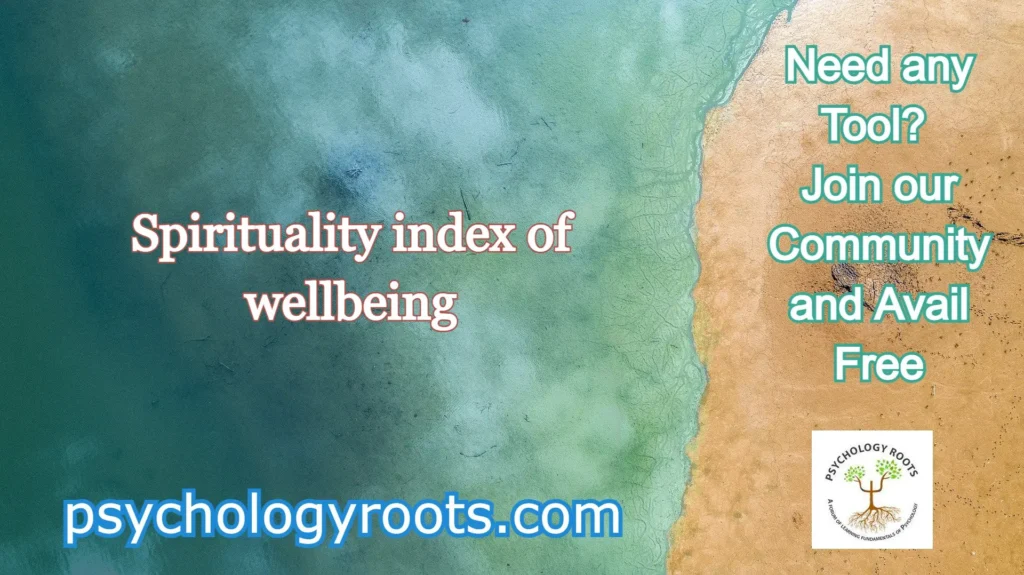Table of Contents
Spirituality Index of Well-Being
Here in this post, we are sharing the “Spirituality Index of Well-Being”. You can read psychometric and Author information. We have thousands of Scales and questionnaires in our collection (See Scales and Questionnaires). You can demand us any scale and questionnaires related to psychology through our community, and we will provide you with a short time. Keep visiting Psychology Roots.
About Spirituality Index of Well-Being
Scale Name
Spirituality Index of Well-Being
Author Details
Daaleman, T. P., and Frey, B. B.
Translation Availability
English

Background/Description
Spirituality index of well-being (Daaleman & Frey, 2004). Spirituality Index of Wellbeing was used to measure spirituality. It contains 12 items with a scoring 5 point scale (strongly agree =1, agree =2, uncertain =3, disagree =4, strongly disagree =5). Items 1-6 make up the Self-Efficacy Subscale. Items 7-12 make up the Life Scheme Subscale. High scores indicate a high level of spirituality.
The Spirituality Index of Well-Being (SIWB) is a concise, 12-item self-report instrument designed to measure the role of spirituality in promoting well-being, specifically within the context of health-related quality of life research. Developed by Daaleman and Frey, the SIWB highlights the connection between spirituality and emotional and physical health. The instrument is grounded in two theoretical constructs: self-efficacy and life schema, reflecting a sense of purpose and the belief in one’s ability to overcome life’s challenges through spirituality.
The SIWB is unique because it focuses on how spirituality interacts with one’s perception of well-being, rather than assessing specific religious beliefs or practices. It is widely used in research and clinical settings to evaluate the spiritual dimension of health and its impact on overall life satisfaction.
Administration, Scoring and Interpretation
- Distribute the questionnaire in a quiet, private setting.
- Instruct participants to answer each item using a Likert scale ranging from 1 (strongly disagree) to 5 (strongly agree).
- Emphasize that the scale measures spirituality as a personal, non-denominational concept.
- Score the responses based on the instrument guidelines, generating a total score.
- Analyze the results to explore the role of spirituality in the individual’s quality of life.
Reliability and Validity
The SIWB has demonstrated strong psychometric properties, including good internal consistency (Cronbach’s alpha > 0.80). Validity studies show that the SIWB correlates well with measures of life satisfaction, psychological well-being, and health outcomes. It is particularly useful in research exploring the interplay between spirituality and chronic illness or stress management.
Available Versions
12-Items
Reference
Daaleman, T. P., & Frey, B. B. (2004). The spirituality index of well-being: A new instrument for health-related quality-of-life research. The Annals of Family Medicine, 2(5), 499-503.
Important Link
Scale File:
Frequently Asked Questions
What does the Spirituality Index of Well-Being measure?
It measures the role of spirituality in enhancing well-being, focusing on self-efficacy and life purpose.
How is the SIWB different from other spirituality measures?
Unlike other tools, the SIWB focuses on the impact of spirituality on health and well-being, rather than religious beliefs or practices.
Is the SIWB culturally sensitive?
Yes, the SIWB has been adapted and validated for use in diverse cultural settings.
What are the components of the SIWB?
The SIWB evaluates self-efficacy and life schema, reflecting purpose and the ability to face challenges through spirituality.
Who can benefit from using the SIWB?
Researchers, clinicians, and counselors exploring the role of spirituality in health, quality of life, and emotional resilience.
Disclaimer
Please note that Psychology Roots does not have the right to grant permission for the use of any psychological scales or assessments listed on its website. To use any scale or assessment, you must obtain permission directly from the author or translator of the tool. Psychology Roots provides information about various tools and their administration procedures, but it is your responsibility to obtain proper permissions before using any scale or assessment. If you need further information about an author’s contact details, please submit a query to the Psychology Roots team.
Help Us Improve This Article
Have you discovered an inaccuracy? We put out great effort to give accurate and scientifically trustworthy information to our readers. Please notify us if you discover any typographical or grammatical errors.
Make a comment. We acknowledge and appreciate your efforts.
Share With Us
If you have any scale or any material related to psychology kindly share it with us at psychologyroots@gmail.com. We help others on behalf of you.